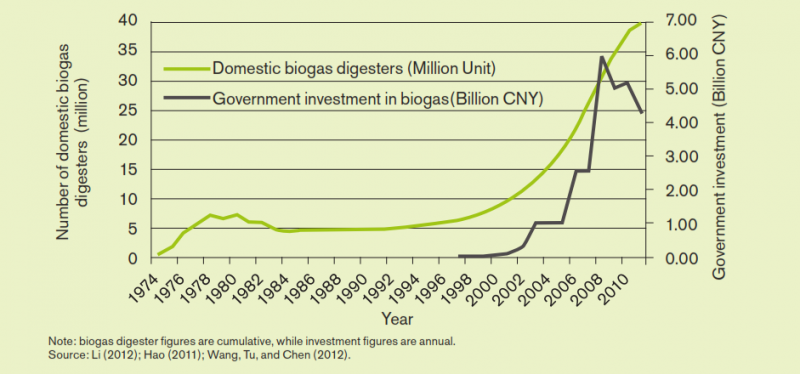- Forum
- categories
- Sanitation systems
- Treatment of wastewater, sludges, organic waste, excreta
- Anaerobic treatment systems (biogas sanitation)
- Biogas sanitation (systems focusing on biogas production)
- Biogas production from Sulabh toilets from public toilets, and biogas sanitation in China
Biogas production from Sulabh toilets from public toilets, and biogas sanitation in China
8507 views
- csk
-

- I work on the toilet, sanitation, biogas, FSM, environmental science and engineering, and I hope to contribute to the toilet revolution in China and in the global. I am happy to share Chinese WASH story.
Less- Posts: 42
- Karma: 1
- Likes received: 15
Re: Biogas production from Sulabh toilets from public toilets, and biogas sanitation in China
Hi, Elisabeth,
I suppose the main reason is due to society transform. Firstly, people don't breed animal at household. The trend for animal husbandry is to developing large and medium-sized farms. so there is no feedstock for household digester any more. Secondly, young people go to urban for jobbing, no one will maintain household digester any more. Third, rural people are getting richer. Fewer people care about the cost of modern energy. It is worthless to use biogas. People prefer natural gas, LNG, or electricity for cooking. In addition, urbanization provides better infrastructure for rural areas, in many places, rural areas can also access to the centralized sewer.
However, in some provinces which have plenty of households digesters, local government still provides the subsidy, if there is still potential for biogas digester.
In 2015, Chinese central government upgraded biogas policy and only provide subsidy to large scale biogas plant or biogas-to-biomethane project, Maximum subsidy for each project could be 50 million CNY (=over 6 million Euro).
Regards
Shikun
I suppose the main reason is due to society transform. Firstly, people don't breed animal at household. The trend for animal husbandry is to developing large and medium-sized farms. so there is no feedstock for household digester any more. Secondly, young people go to urban for jobbing, no one will maintain household digester any more. Third, rural people are getting richer. Fewer people care about the cost of modern energy. It is worthless to use biogas. People prefer natural gas, LNG, or electricity for cooking. In addition, urbanization provides better infrastructure for rural areas, in many places, rural areas can also access to the centralized sewer.
However, in some provinces which have plenty of households digesters, local government still provides the subsidy, if there is still potential for biogas digester.
In 2015, Chinese central government upgraded biogas policy and only provide subsidy to large scale biogas plant or biogas-to-biomethane project, Maximum subsidy for each project could be 50 million CNY (=over 6 million Euro).
Regards
Shikun
Shikun Cheng,
Professor, Ph.D
Center for Sustainable Environmental Sanitation (CSES)
Department of Environmental Science and Engineering
University of Science and Technology Beijing (USTB)
This email address is being protected from spambots. You need JavaScript enabled to view it.
Professor, Ph.D
Center for Sustainable Environmental Sanitation (CSES)
Department of Environmental Science and Engineering
University of Science and Technology Beijing (USTB)
This email address is being protected from spambots. You need JavaScript enabled to view it.
The following user(s) like this post: Elisabeth, samshancn
Please Log in to join the conversation.
You need to login to replyRe: Biogas production from Sulabh toilets from public toilets, and biogas sanitation in China
Dear Elisabeth
For households, Sulabh implements only two pit pour flush toilets. It has implemented more than a million such toilets in India. Under the SBM (G) program of the Government of India, Sulabh has no significant role in implementing household toilets, due to its higher cost demand. Several other NGOs were involved in implementation of such toilets under the subsidy provided by the government.
Sulabh biogas plants are linked with public toilets only. It has implemented more than 200 public toilet linked biogas plants in different states in India ( 5 such biogas plants were implemented in Kabul. Afghanistan), where produced biogas were used for electricity generation also during 2006-07. I don't have further information.
Public toilet linked biogas plant is almost closed now as the program has been transferred to the state governments by the MNRE Government of India and there is no Central Financial Assistance for the program now. Some state governments have provided their own fund for the program and helped implement a few biogas plants.
regards
Pawan
For households, Sulabh implements only two pit pour flush toilets. It has implemented more than a million such toilets in India. Under the SBM (G) program of the Government of India, Sulabh has no significant role in implementing household toilets, due to its higher cost demand. Several other NGOs were involved in implementation of such toilets under the subsidy provided by the government.
Sulabh biogas plants are linked with public toilets only. It has implemented more than 200 public toilet linked biogas plants in different states in India ( 5 such biogas plants were implemented in Kabul. Afghanistan), where produced biogas were used for electricity generation also during 2006-07. I don't have further information.
Public toilet linked biogas plant is almost closed now as the program has been transferred to the state governments by the MNRE Government of India and there is no Central Financial Assistance for the program now. Some state governments have provided their own fund for the program and helped implement a few biogas plants.
regards
Pawan
Pawan Jha
Chairman
Foundation for Environment and Sanitation
Mahavir Enclave
New Delhi 110045, India
Web: www.foundation4es.org
Linked: linkedin.com/in/drpkjha
Chairman
Foundation for Environment and Sanitation
Mahavir Enclave
New Delhi 110045, India
Web: www.foundation4es.org
Linked: linkedin.com/in/drpkjha
Please Log in to join the conversation.
You need to login to reply- Elisabeth
-
- User is blocked
- Freelance consultant since 2012
Less- Posts: 3372
- Karma: 54
- Likes received: 932
Re: Biogas production from Sulabh toilets from public toilets, and biogas sanitation in China
Thanks Pawan.
That blog post that Arno had linked to (with a picture of a UDDT) was from 2010. Would be interesting to have more updated figures available anyhow for the Sulabh toilets.
The book that you mentioned is available here in the library:
Ministry of Drinking Water and Sanitation, Government of India (2015). Technological Options for Solid and Liquid Waste Management in Rural Areas - Swachh Bharat Mission (GRAMIN). Government of India
www.susana.org/en/knowledge-hub/resource...library/details/2322
Shikun:
Why are the biogas toilets (household digester) no longer subsidised in China? Is it because they were found to be problematic or because they are so popular and cheap that no subsidies were needed anymore?
Regards,
Elisabeth
That blog post that Arno had linked to (with a picture of a UDDT) was from 2010. Would be interesting to have more updated figures available anyhow for the Sulabh toilets.
The book that you mentioned is available here in the library:
Ministry of Drinking Water and Sanitation, Government of India (2015). Technological Options for Solid and Liquid Waste Management in Rural Areas - Swachh Bharat Mission (GRAMIN). Government of India
www.susana.org/en/knowledge-hub/resource...library/details/2322
Shikun:
Why are the biogas toilets (household digester) no longer subsidised in China? Is it because they were found to be problematic or because they are so popular and cheap that no subsidies were needed anymore?
Regards,
Elisabeth
Dr. Elisabeth von Muench
Freelance consultant on environmental and climate projects
Freelance consultant on environmental and climate projects
The following user(s) like this post: samshancn
Please Log in to join the conversation.
You need to login to replyRe: Biogas production from Sulabh toilets from public toilets, and biogas sanitation in China
Dear Kelvin and All
The above link (challenges.openideo.com/challenge/how-ca...th-and-human-dignity), has front page showing photograph of the urine diverting toilet with caption of Sulabh toilet. It is wrong- not a Sulabh toilet.
As you rightly mentioned, twin pit toilet is completely different with biogas digester. Sulabh biogas plants are always linked with public toilets.
Design of two pit pour flush toilet is available everywhere. Under the Swachh Bharat Mission Rural (SBM G) millions of such toilets have been implemented in India. There are some serious problems with the system. Such toilets are being implemented even in high water table / flood affected and water logged areas and safe distance from drinking water source to leach pits is rarely taken into consideration. In most of the rural areas, ground water through hand pumps, wells is the only source for drinking water. In such case, there is a severe chance of contamination of drinking water source that may affect community health and environment irreversibly, in near future.
The limitations of leach pit toilets have been highlighted in the book- Technical options for on-site technologies, released by the Ministry of Drinking Water and Sanitation. However, it is never followed. I raised this issue several times during different meetings / discussions with the concerned officers but could not succeed.
In case of low water table areas, such toilets are working well and households use digested manure for agricultural purposes. However, in some cases households hesitate to dig it out due to psychological taboos and hire laborers to clean pit.
regards
Pawan
The above link (challenges.openideo.com/challenge/how-ca...th-and-human-dignity), has front page showing photograph of the urine diverting toilet with caption of Sulabh toilet. It is wrong- not a Sulabh toilet.
As you rightly mentioned, twin pit toilet is completely different with biogas digester. Sulabh biogas plants are always linked with public toilets.
Design of two pit pour flush toilet is available everywhere. Under the Swachh Bharat Mission Rural (SBM G) millions of such toilets have been implemented in India. There are some serious problems with the system. Such toilets are being implemented even in high water table / flood affected and water logged areas and safe distance from drinking water source to leach pits is rarely taken into consideration. In most of the rural areas, ground water through hand pumps, wells is the only source for drinking water. In such case, there is a severe chance of contamination of drinking water source that may affect community health and environment irreversibly, in near future.
The limitations of leach pit toilets have been highlighted in the book- Technical options for on-site technologies, released by the Ministry of Drinking Water and Sanitation. However, it is never followed. I raised this issue several times during different meetings / discussions with the concerned officers but could not succeed.
In case of low water table areas, such toilets are working well and households use digested manure for agricultural purposes. However, in some cases households hesitate to dig it out due to psychological taboos and hire laborers to clean pit.
regards
Pawan
Pawan Jha
Chairman
Foundation for Environment and Sanitation
Mahavir Enclave
New Delhi 110045, India
Web: www.foundation4es.org
Linked: linkedin.com/in/drpkjha
Chairman
Foundation for Environment and Sanitation
Mahavir Enclave
New Delhi 110045, India
Web: www.foundation4es.org
Linked: linkedin.com/in/drpkjha
The following user(s) like this post: Elisabeth
Please Log in to join the conversation.
You need to login to reply- csk
-

- I work on the toilet, sanitation, biogas, FSM, environmental science and engineering, and I hope to contribute to the toilet revolution in China and in the global. I am happy to share Chinese WASH story.
Less- Posts: 42
- Karma: 1
- Likes received: 15
Re: Biogas production from Sulabh toilets from public toilets, and biogas sanitation in China
Hi, Arno,
Installation of household digester in China is not promoted by central government any more, since the subsidy to household digester had been removed in 2015.
I guess the number is declining but official number is still 40 million up to date.
Kind regards
Shikun Cheng
Installation of household digester in China is not promoted by central government any more, since the subsidy to household digester had been removed in 2015.
I guess the number is declining but official number is still 40 million up to date.
Kind regards
Shikun Cheng
Shikun Cheng,
Professor, Ph.D
Center for Sustainable Environmental Sanitation (CSES)
Department of Environmental Science and Engineering
University of Science and Technology Beijing (USTB)
This email address is being protected from spambots. You need JavaScript enabled to view it.
Professor, Ph.D
Center for Sustainable Environmental Sanitation (CSES)
Department of Environmental Science and Engineering
University of Science and Technology Beijing (USTB)
This email address is being protected from spambots. You need JavaScript enabled to view it.
The following user(s) like this post: samshancn
Please Log in to join the conversation.
You need to login to reply- kevintayler
-

- I am a water and sanitation engineer, also interested in general urban housing issues. In recent years, I have worked on FSM for various organizations
Less- Posts: 79
- Karma: 11
- Likes received: 46
Re: Biogas production from Sulabh toilets from public toilets, and biogas sanitation in China
Thanks for posting these links Arno. The first one does not say so explicitly but does confirm my point that the biogas production from Sulabh toilets is from their public toilets, which do not use the twin pit system. My point remains, that there is a big gap between the theory of twin pit systems and what happens in practice. I referred to my experience in Bangladesh visiting toilets that had been promoted by an internationally supported project, which in theory included a strong emphasis on educating users on the correct use of the toilets. I should also have mentioned that there is an old WEDC report by Andy Cotton and Richard Franceys that looked at twin pit systems in Sri Lanka and (I think) Southern India and found that few were being used as intended. I do not have the details of this paper and it does not seem to be available on the internet but it definitely reports problems.
It would be interesting to have information on any independent evaluation of the Sulabh twin-pit toilets. How did they work, what were the problems, what steps were taken to overcome those problems and did those steps work? If anyone has any information on this, it would provide a really useful contribution to the discussion.
It would be interesting to have information on any independent evaluation of the Sulabh twin-pit toilets. How did they work, what were the problems, what steps were taken to overcome those problems and did those steps work? If anyone has any information on this, it would provide a really useful contribution to the discussion.
Kevin Tayler
Independent water and sanitation consultant
Horsham
UK
Independent water and sanitation consultant
Horsham
UK
The following user(s) like this post: canaday
Please Log in to join the conversation.
You need to login to replyBiogas production from Sulabh toilets from public toilets, and biogas sanitation in China
Note by moderator: this post was originally in this thread about pour flush toilets:
forum.susana.org/comparisons-of-various-...frica?start=24#18395
++++++++++
Chris, Kevin, Sjoerd, Dave, Andrew, Suhir,
Here are a few more links to the Sulabh systems.
challenges.openideo.com/challenge/how-ca...th-and-human-dignity
www2.ohchr.org/english/issues/water/iexp...%20International.pdf
And in China household biogas systems made up of pour flush toilets also receiving piggery slurry has grown to enormous proportions - assisted by government programmes. Over 40 million installations and that was some 5 years ago.
forum.susana.org/comparisons-of-various-...frica?start=24#18395
++++++++++
Chris, Kevin, Sjoerd, Dave, Andrew, Suhir,
Here are a few more links to the Sulabh systems.
challenges.openideo.com/challenge/how-ca...th-and-human-dignity
www2.ohchr.org/english/issues/water/iexp...%20International.pdf
And in China household biogas systems made up of pour flush toilets also receiving piggery slurry has grown to enormous proportions - assisted by government programmes. Over 40 million installations and that was some 5 years ago.
Arno Rosemarin PhD
Stockholm Environment Institute
This email address is being protected from spambots. You need JavaScript enabled to view it.
www.sei.org
www.ecosanres.org
Stockholm Environment Institute
This email address is being protected from spambots. You need JavaScript enabled to view it.
www.sei.org
www.ecosanres.org
Attachments:
-
 Chinabiogas.png
(Filesize: 323KB)
Chinabiogas.png
(Filesize: 323KB)
Please Log in to join the conversation.
You need to login to reply
Share this thread:
- Forum
- categories
- Sanitation systems
- Treatment of wastewater, sludges, organic waste, excreta
- Anaerobic treatment systems (biogas sanitation)
- Biogas sanitation (systems focusing on biogas production)
- Biogas production from Sulabh toilets from public toilets, and biogas sanitation in China
Recently active users. Who else has been active?
Time to create page: 0.159 seconds








